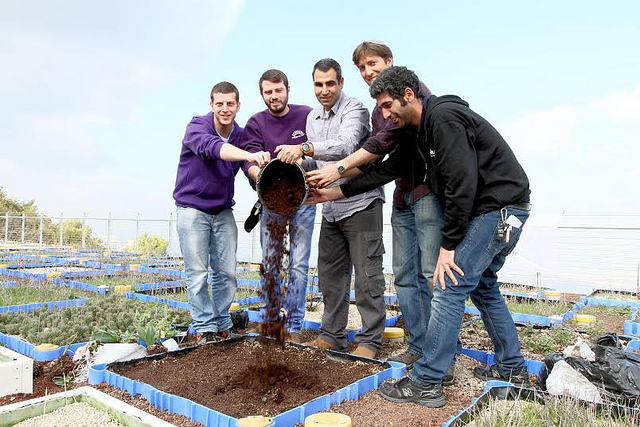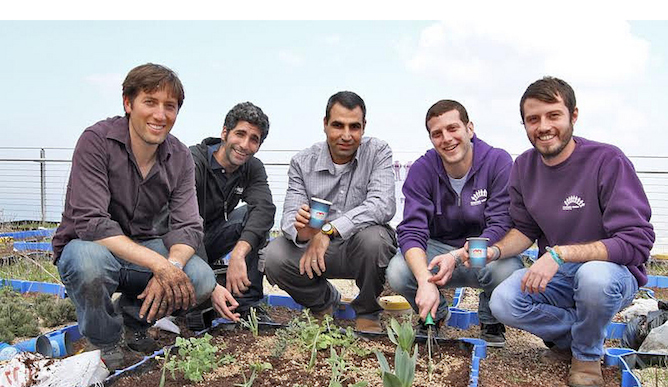“Coffee on the roof” sounds like a spoof on the old fiddler play, but with an Israeli twist. A fascinating new research project from Israel is looking at the effects of coffee grounds on rooftop gardens. Researchers hope to “stimulate” a new kind of recycling business.
Not only has the favorite drink been proven a powerful antioxidant, but it has also been established that used coffee grounds can make an excellent fertilizer or compost material. But how does the end of your cup of joe fare on rooftop gardens? Can hipsters in Brooklyn start dumping their espresso grounds on their own self-contained city gardens?
A new Israeli study aims to answer this question.
Researchers at the University of Haifa have spread about 40 pounds of coffee waste on the university’s rooftop garden to see if it will help sprout the seeds they planted there. The research is being carried out at the unique Kadas Green Roofs Ecology Research Center, run by the Faculty of Natural Sciences’ Institute of Evolution.
The Student Union and the Green Campus project are also involved in taking coffeemaker waste from the cafeterias to see how it affects different species of vegetation. Will the plants get a buzz? Will they grow like weeds or show no effect at all?
According to the scientists, the aim is not just to see if the coffee grounds will work, but to see if they can offer any substantial benefits over regular soil, and enhance the plant’s growth.
Entrepreneurs in America have already found that coffee grounds can make an excellent habitat for home mushroom growing, for instance. And as more and more people are keen to grow their own food at home, whether on rooftop gardens or hydroponically, research like this can take out some of the guesswork involved in what works in the urban environment, where people are crazy about coffee –– and doing good for planet earth.

“At our research center, we have a number of studies going that are examining what quality of the substrate and types of plants that would be most suited for use on green roofs even with little or no maintenance,” said Shay Levy, the center’s manager.
“Using coffee waste is liable to improve the mix of minerals in the soil, and as a result, also improve plant growth on the roof.”
Startup Nation of coffee-drinkers
Researchers already know the benefits of using organic waste in farming, but coffee grounds have not been studied on rooftop conditions where soil nutrients are limited by what is put directly into the soil.
The idea to study coffee originated with Prof. Shai Linn, the dean of the Faculty of Social Welfare and Health Sciences and a member of the university’s Green Campus council.
Among the seeds planted on this special caffeinated substrate include a local Maltese Cross Ricotia, daffodils, and herbs including hyssop and sage.
The rains have watered the garden’s roof and now it is a waiting game.
“This is a great way to turn waste into a resource,” said Levy. “There’s no lack of coffee waste; on the contrary, we have more than enough of it. If we can prove that the coffee improves plant growth, it could be an amazingly ecological and economical solution for us and for the environment.”
Learn more about the University of Haifa’s Green Roofs project from ISRAEL21c’s previous article, “Turning Israeli roofs into green habitats”
















